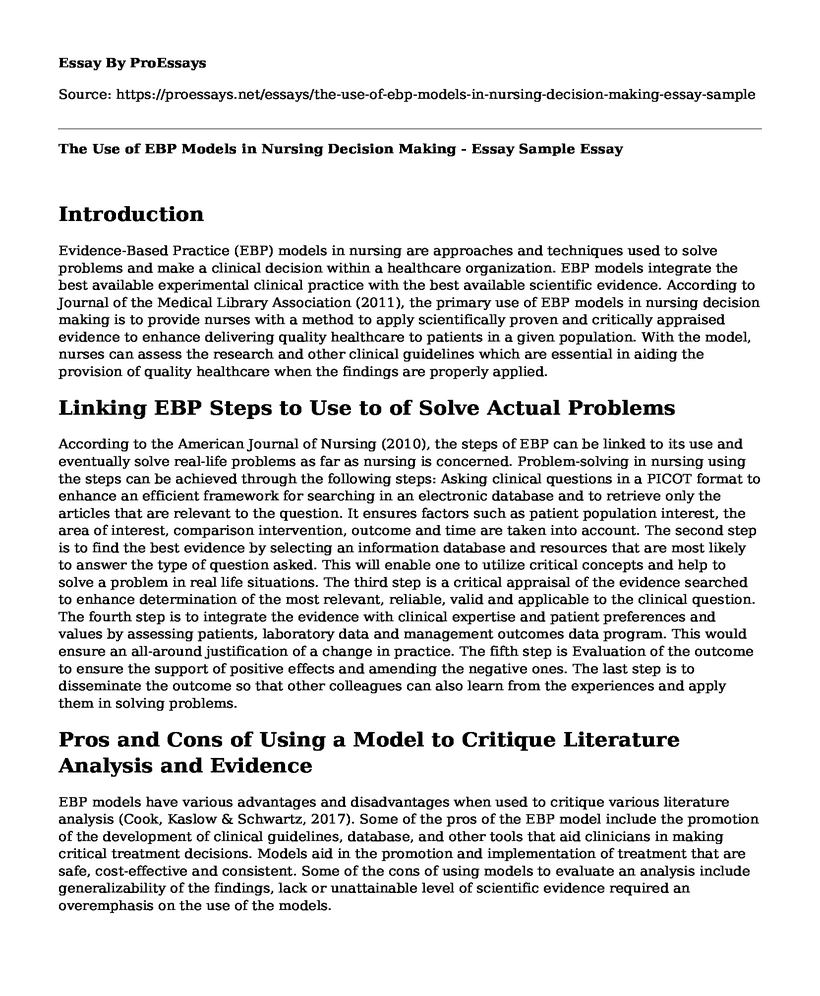Introduction
Evidence-Based Practice (EBP) models in nursing are approaches and techniques used to solve problems and make a clinical decision within a healthcare organization. EBP models integrate the best available experimental clinical practice with the best available scientific evidence. According to Journal of the Medical Library Association (2011), the primary use of EBP models in nursing decision making is to provide nurses with a method to apply scientifically proven and critically appraised evidence to enhance delivering quality healthcare to patients in a given population. With the model, nurses can assess the research and other clinical guidelines which are essential in aiding the provision of quality healthcare when the findings are properly applied.
Linking EBP Steps to Use to of Solve Actual Problems
According to the American Journal of Nursing (2010), the steps of EBP can be linked to its use and eventually solve real-life problems as far as nursing is concerned. Problem-solving in nursing using the steps can be achieved through the following steps: Asking clinical questions in a PICOT format to enhance an efficient framework for searching in an electronic database and to retrieve only the articles that are relevant to the question. It ensures factors such as patient population interest, the area of interest, comparison intervention, outcome and time are taken into account. The second step is to find the best evidence by selecting an information database and resources that are most likely to answer the type of question asked. This will enable one to utilize critical concepts and help to solve a problem in real life situations. The third step is a critical appraisal of the evidence searched to enhance determination of the most relevant, reliable, valid and applicable to the clinical question. The fourth step is to integrate the evidence with clinical expertise and patient preferences and values by assessing patients, laboratory data and management outcomes data program. This would ensure an all-around justification of a change in practice. The fifth step is Evaluation of the outcome to ensure the support of positive effects and amending the negative ones. The last step is to disseminate the outcome so that other colleagues can also learn from the experiences and apply them in solving problems.
Pros and Cons of Using a Model to Critique Literature Analysis and Evidence
EBP models have various advantages and disadvantages when used to critique various literature analysis (Cook, Kaslow & Schwartz, 2017). Some of the pros of the EBP model include the promotion of the development of clinical guidelines, database, and other tools that aid clinicians in making critical treatment decisions. Models aid in the promotion and implementation of treatment that are safe, cost-effective and consistent. Some of the cons of using models to evaluate an analysis include generalizability of the findings, lack or unattainable level of scientific evidence required an overemphasis on the use of the models.
Evaluation and Summary of Research Studies Using a Critical Appraisal Tool
Evaluation and summary of findings of a research study indicate that the studies addressed a clearly focused question and use a valid method to address the asked question. The valid results of the study are important and applicable to the patients and the patients' population. As a result, the study is deemed relevant and positively impact healthcare organizations and hence relevant.
References
American Journal of Nursing. (2010). Evidence-Based Practice: Step by Step: The Seven Steps of Evidence-Based Practice https://journals.lww.com/ajnonline/Fulltext/2010/01000/Evidence_Based_Practice__Step_by_Step__The_Seven.30.aspx
Cook, Kaslow & Schwartz. (2017). Evidence-Based Psychotherapy: Advantages and Challenges. Retrieved from https://www.ncbi.nlm.nih.gov/pmc/articles/PMC5509639/Journal of the Medical Library Association. (2011).
Adopting Evidence-Based Practice in Clinical Decision Making: Nurses Perceptions, Knowledge, and Barriers. Retrieved from https://www.ncbi.nlm.nih.gov/pmc/articles/PMC3133901/
Cite this page
The Use of EBP Models in Nursing Decision Making - Essay Sample. (2022, Nov 14). Retrieved from https://proessays.net/essays/the-use-of-ebp-models-in-nursing-decision-making-essay-sample
If you are the original author of this essay and no longer wish to have it published on the ProEssays website, please click below to request its removal:
- Supplemental Nutrition Programs Essay Example
- Essay Sample on "Nursing Care for Mary Craig: Evidence-Based Approach to Treating Type II Diabetes"
- Functional Analysis: A Treatment Approach to Substance Abuse - Essay Sample
- Annotated Bibliography: Vaping Bans: Consequences & Impact on Health
- Research Paper on Malnutrition: Devastating Effects from Birth to Adulthood
- My Big Brother's Cancer Diagnosis: A Life-Changing Moment - Paper Example
- Healthcare for Undocumented Immigrants- Report Sample







